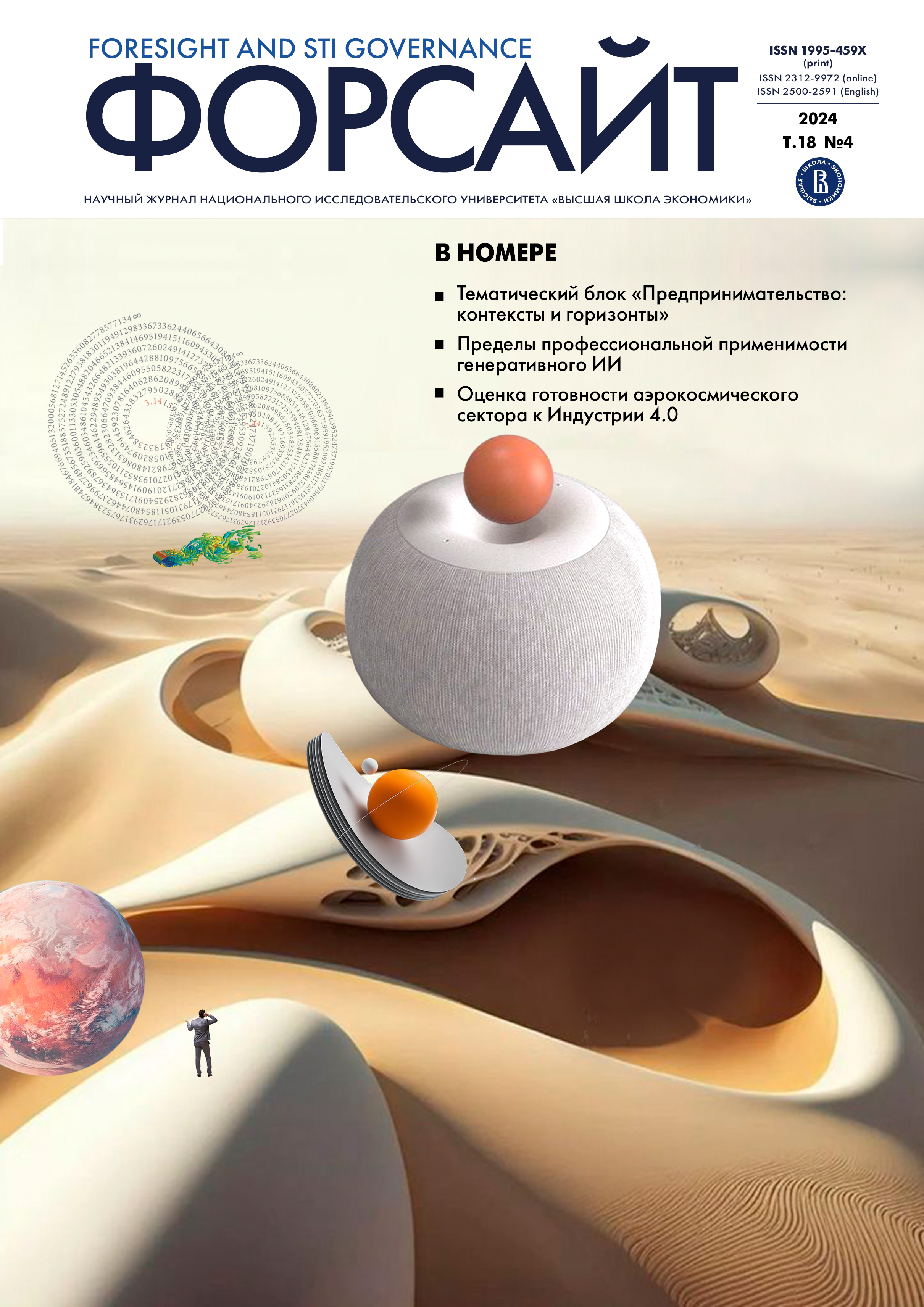Аннотация
Аэрокосмическая индустрия как одна из наиболее наукоемких отраслей выступает в двойной роли по отношению к передовым технологиям, являясь одновременно их генератором и пользователем. Превентивно адаптируясь к более сложным стратегиям и технологиям, зачастую в ритме нелинейных «скачков», она вытягивает и другие сектора на недостижимые ранее уровни развития.
В статье рассматриваются основные тренды и технологические достижения в мировой аэрокосмической индустрии, касающиеся новых материалов для летательных аппаратов, наиболее перспективных направлений для инвестиций, описывается трансформация глобальных отраслевых цепочек стоимости. Авторы предлагают оригинальную модель для оценки технологической зрелости аэрокосмического сектора. Данный инструмент апробирован на примере Бразилии. Пилотное тестирование выявило, что для местных аэрокосмических компаний, при их достаточно развитой промышленной базе и привлекательности даже для рынков развитых стран, по большинству рассмотренных аспектов технологической зрелости их потенциал в отношении Индустрии 4.0 еще ожидает своего раскрытия. Представленная модель может быть адаптирована к оценке технологической зрелости других отраслей экономики.
Литература
Alberti F.G., Pizzurno E. (2015) Knowledge exchanges in innovation networks: Evidences from an Italian aerospace cluster. Competitiveness Review, 25(3), 258-287. DOI: https://doi.org/10.1108/CR-01-2015-0004
Bamber P., Gereffi G., Frederick S., Guinn A. (2016) Costa Rica in the Aerospace Global Value Chain: Opportunities for Entry & Upgrade, Durham, NC: Duke Center on Globalization, Governance & Competitiveness.
Barata J., Cunha P.R. (2017) Climbing the maturity ladder in industry 4.0: A framework for diagnosis and action that combines national and sectoral strategies. Paper presented at the 23rd Americas Conference on Information Systems, Boston, United States 10-12 August 2017.
Bonilla S.H., Silva H.R., Silva M.T, Franco G.R., Sacomano J.B. (2018) Industry 4.0 and sustainability implications: A scenario-based analysis of the impacts and challenges. Sustainability, 10(10), 3740. DOI: https://doi.org/10.3390/su10103740
Bravo-Mosquera P.D., Catalano F.M., Zingg D.W. (2022) Unconventional aircraft for civil aviation: A review of concepts and design methodologies. Progress in Aerospace Sciences, 131, 100813. DOI: https://doi.org/10.1016/j.paerosci.2022.100813
Caliari T., Ferreira M.J.B. (2022) The historical evolution of the Brazilian aeronautical sector: A combined approach based on mission-oriented innovation policy (MOIP) and sectoral innovation system (SIS). Economics of Innovation and New Technology, 32(5), 682-699. DOI: https://doi.org/10.1080/10438599.2021.2011258
Caliari T., Ribeiro L.C., Pietrobelli C., Vezzani A. (2023) Global value chains and sectoral innovation systems: An analysis of the aerospace industry. Structural Change and Economic Dynamics, 65, 36-48,. DOI: https://doi.org/10.1016/j.strueco.2023.02.004
Cooke P., Ehret O. (2009) Proximity and procurement: А study of agglomeration in the Welsh aerospace industry. European Planning Studies, 17(4), 549-567. DOI: https://doi.org/10.1080/09654310802682115
Deloitte (2024) 2024 Aerospace and Defense Industry Outlook, London: Deloitte. https://www2.deloitte.com/us/en/insights/industry/aerospace-defense/aerospace-and-defense-industry-outlook.html.
Few S. (2006), Stephen. Information Dashboard Design: The Effective Visual Communication of Data. 223p, 2006. North Sebastopol, CA: O'Reilly Media, Inc.
FIESP (2019) Sondagem Fiesp de Indústria 4.0, São Paulo: Federação das Indústrias do Estado de São Paulo.
Gkotsis P., Vezzani A. (2022) The price tag of technologies and the ‘unobserved' R&D capabilities of firms. Economics of Innovation and New Technology, 31(5), 339-361. DOI: https://doi.org/10.1080/10438599.2020.1799141
Heerkens G. (2007) Introducing the revolutionary strategic project management maturity model (SPM3). Paper presented at Project Management Institute (PMI) Global Congress 2007, North America, Atlanta, GA.
Landoni M., Ogilvie D.T. (2019) Convergence of innovation policies in the European aerospace industry (1960-2000). Technological Forecasting and Social Change, 147, 174-184. DOI: https://doi.org/10.1016/j.techfore.2019.07.007
Lee J.J., Yoon H.A. (2015) Comparative study of technological learning and organizational capability development in complex products systems: Distinctive paths of three latecomers in military aircraft industry. Research Policy, 44(7), 1296-1313. DOI: https://doi.org/10.1016/j.respol.2015.03.007
Lema R., Pietrobelli C., Rabellotti R. (2019) Innovation in global value chains. In: Handbook On Global Value Chains (eds. S. Ponte, G. Gereffi, G. Raj-Reichert), Chelteham: Edward Elgar Publishing, pp. 370-384.
McGuire S. (2014) Global value chains and state support in the aircraft industry. Business and Politics, 16(4), 615-639. DOI: https://doi.org/10.1515/bap-2014-0014
Niosi J., Zhegu M. (2005) Aerospace clusters: Local or global knowledge spillovers? Industry and Innovation, 12(1), 5-29. DOI: https://doi.org/10.1080/1366271042000339049
Niosi J., Zhegu M. (2010) Multinational corporations, value chains and knowledge spillovers in the global aircraft industry. Institutions and Economies, 2(2), 109-141.
Rebolledo C., Nollet J. (2011) Learning from suppliers in the aerospace industry. International Journal of Production Economics, 129 (2), 328-337. DOI: https://doi.org/10.1016/j.ijpe.2010.11.008
Reis M., Wehmann C., Martinez M., Reis P. (2021) Mapeamento Patentário Sobre as Tecnologias Aeroespaciais das Instituições de Pesquisa e das Empresas Brasileiras. Cadernos de Prospecção, 14(4), 1219-1235. DOI: https://doi.org/10.9771/cp.v14i4.42426
Robinson D.K.R., Mazzucato M. (2019) The evolution of mission-oriented policies: Exploring changing market creating policies in the US and European space sector. Research Policy, 48(4), 936-948. DOI: https://doi.org/10.1016/j.respol.2018.10.005
Schumacher A., Erol S., Sihn W. (2016) A maturity model for assessing Industry 4.0 readiness and maturity of manufacturing enterprises. Procedia CIRP, 52, 161-166. DOI: https://doi.org/10.1016/j.procir.2016.07.040
Soni R., Verma R., Garg R.K., Sharma V. (2023) A critical review of recent advances in the aerospace materials. Materials Today: Proceedings, 12.08.2023. DOI: https://doi.org/10.1016/j.matpr.2023.08.108
Turkina E., van Assche A., Kali R. (2016) Structure and evolution of global cluster networks: Evidence from the aerospace industry. Journal of Economic Geography, 16(6), 1211-1234. DOI: https://doi.org/10.1093/jeg/lbw020
World Bank (2020) World Development Report 2020: Trading for Development in the Age of Global Value Chains, Washington, D.C.: World Bank.
Xavier A., Reyes T., Aoussat A., Luiz L., Souza L. (2020) Eco-innovation maturity model: A framework to support the evolution of eco-innovation integration in companies. Sustainability, 12(9), 3773. DOI: https://doi.org/10.3390/su12093773

Это произведение доступно по лицензии Creative Commons «Attribution» («Атрибуция») 4.0 Всемирная.


